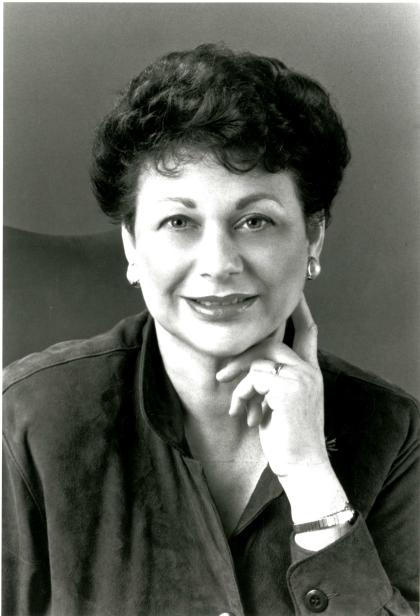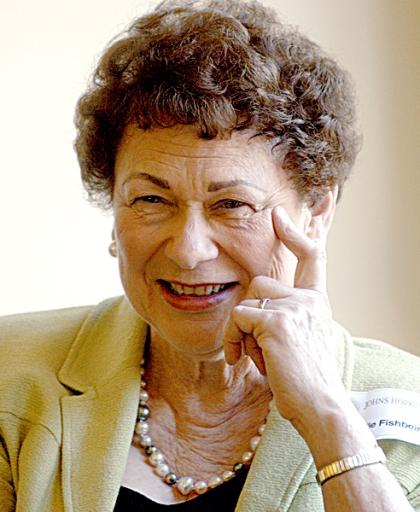Estelle Fishbein, a trailblazing attorney who was Johns Hopkins University's first general counsel and later became a university vice president, died on Dec. 2. She was 89.
From the time she created the Office of General Counsel in 1975 until her retirement in January 2004, Fishbein deftly steered the university through countless litigations and legal matters while also mentoring dozens of talented attorneys who would go on to become leaders in higher education law and beyond. Her work often involved the most pressing issues of the time, including civil rights, Title 9, and HIPAA. She added the title of vice president in 1991, becoming one of the first women in the university's history to reach that level of leadership.

Image caption: Estelle Fishbein, circa 1987
Image credit: Johns Hopkins University Sheridan Libraries
"She fiercely believed in the mission of Johns Hopkins and higher education," said Gerard St. Ours, one of JHU's current senior associate general counsels. "Not only did she have our backs, but she was going to be there for the institution. That sometimes meant taking stands that were courageous, but at the same time she was pragmatic and smart and strategic, and taught us all that."
A native of the Bronx, New York, Fishbein earned a bachelor's degree from Hunter College in New York and a law degree from Yale Law School. She worked as an attorney for the University of Maryland and the United States Department of Health, Education, and Welfare before joining JHU, where she built the Office of General Counsel.
In 1980, Fishbein became the first female president of the National Association of College and University Attorneys (NACUA), an organization dedicated to strengthening the work of higher education lawyers. At the time, only 8% of all lawyers were female, making Fishbein especially notable in the field.
"She was among the trailblazers, first as a woman lawyer, but also there at the creation of higher education law," St. Ours said. "One thing I was aware of when I joined was 'Wow, I am working with a living legend.'"
As president of NACUA, Fishbein was genuinely committed to improving the resources available to other attorneys and universities, according to her peers.
"She always helped other general counsels and offered her time to everyone," said Eileen Goldgeier, who worked under Fishbein from 1992 to 1997 and currently serves as vice president and general counsel at Brown University. "If anyone at NACUA called, she would answer the phone, she would refer it to one of us, and we were always able and willing to help any other attorney in higher ed. It just makes the practice that much more meaningful. … This is my third time as general counsel, and every time I think, 'What would Estelle do?'"
Fishbein was deeply committed to her work and the university. "I think I have the best law job in the state of Maryland," she said in a 1995 interview with the Johns Hopkins Gazette. Under Fishbein's guidance, JHU's Office of General Counsel grew from two to seven attorneys. Her decades of leadership also earned her a deep respect from other lawyers in the state, which Associate General Counsel Clyde Bernett realized during his own journey to become an attorney.

Image caption: Estelle Fishbein, circa 2005
Image credit: Will Kirk / Johns Hopkins University
"Part of the process of becoming a lawyer is … a member of the bar reviews your record and then determines whether you are fit for practice," Bernett said. "So I got a recommendation from Estelle, and I met with this partner at a law firm in Towson. … I wasn't in there more than five minutes, and I think she asked me one question. And I was like, 'Is that it?' And she said, 'I hold a letter from Estelle Fishbein. I have so much respect for her that there's no way I can actually contradict her judgment. No disrespect to your record, but all I needed was this letter.'"
Fishbein's sterling reputation, former colleagues said, was a testament to her talent as a lawyer. Her intelligence and tenacity often impressed those around her, setting a clear example for the other attorneys in the office.
"She was one of the smartest people I've ever known," said former Deputy General Counsel Derek Savage, who was hired by Fishbein in 1985. "She was a terrific advocate and a terrific lawyer. … If she thought we were in the right, then she wanted to defend the people who had made the decisions and not simply settle a matter because it was more convenient."
Patty McLean, a former senior associate for the general counsel, agreed.
"She was a woman of absolute integrity," she said. "She did not put up with people's shenanigans, and she called them out. If she thought that the institution's interests would be best served by working out an agreement, she got what the institution needed in the negotiations and they were fair."
Added Eugene S. Sunshine, the university's senior vice president for administration from 1989 to 1997: "She knew her stuff and was not afraid to express it. If you said something wrong, no matter what your title was—a member of the board of trustees or some other very senior person in the administration—she was going to tell you and explain why."
Those who knew her best also remember Fishbein as a fun-loving friend and co-worker. In addition to swapping jokes, she would sometimes break out into an impromptu song or tap dance routine, with a special place in her heart for Patsy Cline's Crazy.
"It was very fun to work with Estelle," St. Ours said. "We did a lot of hard work, but Estelle brought a sense of humor."
In 2005, Fishbein received the Alumni Association's Heritage Award, which recognizes those who have dedicated outstanding service to the university. Attendees included her husband Ronald, who also worked for Hopkins as an associate professor emeritus of surgery at the School of Medicine and Homewood campus's assistant dean for preprofessional advising.
Though she retired two decades ago, current Hopkins attorneys say Fishbein's influence can still be felt.
"She set the template for our office being involved in a constructive way across the university," St. Ours said. "We're not just here to tell you what the regulation says. We're here to help you solve your problem. Estelle really lived and breathed that. She instilled it in us and I think that continues."
Fishbein is survived by her two sons: Rand and Jonathan; six grandchildren: Eitan, Aliza, Yael, Zane, Joshua, and Natan; and three great-grandchildren: Leora, Gavi, and Eyal.
Posted in University News







